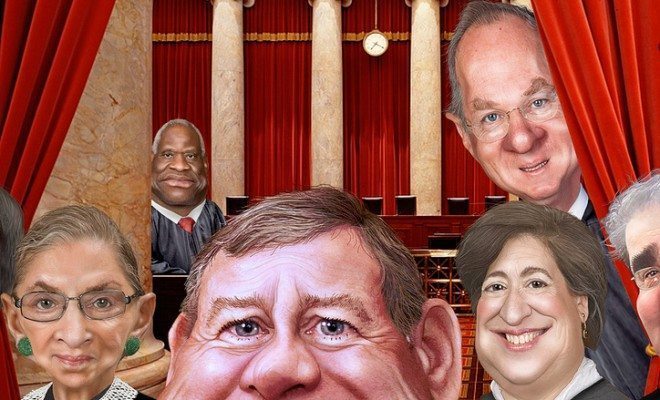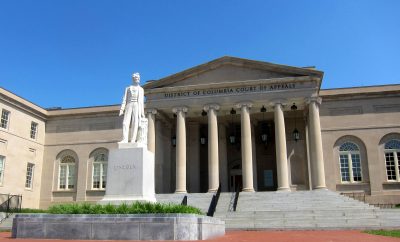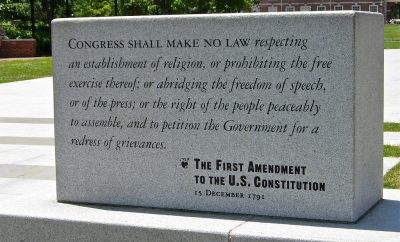 Image courtesy of [DonkeyHotey via Flickr]
Image courtesy of [DonkeyHotey via Flickr]
News
Cases to Watch in 2014: Where are They Now
In January I published a break down of the top cases and judicial issues to watch in 2014. Now that the year is coming to an end, it seems appropriate to give you a progress report and see where those cases all ended up.
8. Lavabit and Ladar Levison
The case in January: After Edward Snowden’s revelations about NSA spying, it was discovered that he was using an encrypted email service called Lavabit. The owner, Ladar Levison, was court-ordered to hand over access to the entire site to the government, because Lavabit’s programming made it impossible to hand over access to just Snowden’s account. In protest, Levison shut down the site, defied a gag order, and has now filed an appeal.
What happened in 2014: Ladar Levison lost his appeal in April when he was hit with contempt of court charges. However, the Fourth Circuit Court of Appeals, where the case was held, didn’t rule against Levison because of the merits of the case, but rather because it believed he had made a procedural misstep from the beginning and its hands were tied.
7. Jodi Arias
The case in January: In 2013, we saw the extremely weird case involving Jodi Arias in Arizona. She was eventually convicted of murdering her boyfriend, Travis Alexander. It was a gruesome and disturbing case in which the jury found her guilty; however, they could not agree on whether to sentence her to life in prison, or to death. A mistrial was declared on the sentencing portion of her trial and the new sentencing trial will also have new jurors.
What happened in 2014: The sentencing phase of Arias’ case is still underway. There’s controversy over some “mystery witness” and Arias demanding that the proceedings be made secret. What Arias’ sentence will be remains just as big of a mystery.
6. McCullen v. Coakley
The case in January: McCullen v. Coakley has been waiting for its day in court since 2001. There was appeal after appeal before the Justices agreed to hear it. It involves a law that Massachusetts instituted to create a 35-foot buffer zone around reproductive health facilities.
What happened in 2014: SCOTUS ruled the Massachusetts buffer zones unconstitutional in the sense that they impeded protesters’ Freedom of Speech. If you’d like more information on the case, check out fellow Law Streeter Erika Bethmann’s excellent takedown of the decision: Sorry SCOTUS, Harassment isn’t Free Speech.
5. Silkroad Case
The case in January: The infamous illegal-good site Silk Road was removed from the web last Fall, and its alleged creator, Ross Ulbricht, was arrested. The site sold drugs and fraudulent IDs, among other things. In addition to being indicted for his work on the site, he has was accused of hiring assassins. The $80 million he allegedly made through the site is now in government custody.
What happened in 2014: The case against Ross Ulbrecht has been delayed until January 2015. He pleaded not guilty to various drug trafficking, money laundering, hacking, and criminal enterprise charges. According to his defense counsel, the case has been delayed because:
The court did not provide its reasons for the adjournment, but we asked for it earlier this week based on a couple of factors: the danger that the trial would run into the Christmas holidays, which would affect juror availability and the continuity of the trial; some technical and logistical delays (owing to the limitations inherent in Mr. Ulbricht’s pretrial confinement) in getting Mr Ulbricht access to some discovery; some other scheduling issues.
4. Marriage rights
The case(s) in January: The Supreme Court already put a stop to Utah’s same-sex marriage licenses in 2014. The case will now go to the nearest appeals court. This is just one example; there are other cases regarding the rights of homosexuals to marry all over the United States.
What happened in 2014: The victories just keep coming for gay marriage advocates. One of the biggest was on October 6 when the Supreme Court chose not to hear a whole collection of cases challenging same-sex marriage bans in a bunch of different states. Because it declined to weigh in on the appeals court decisions that had ruled the marriage bans unconstitutional, SCOTUS effectively increased the number of states with gay marriage to 30.
3. Voting Rights Cases
The case(s) in January: There have been a variety of efforts at the state level to change voting rights laws, and the DOJ and various special interest groups have stood up to these changes when needed. But in 2013, part of the Voting Rights Act was struck down by the Supreme Court. So, each challenge to voting rights has to be filed against separately. As a result, many suits will be heard in 2014 to states’ attempted voting rights changes.
What happened in 2014: As with gay marriage, there are a lot of cases still running through the system. Unlike gay marriage, there hasn’t been quite as much progress. There have been some cases argued in front of appeals courts, and some voter ID laws struck down, such as in Wisconsin and Texas. It seems like voter ID laws, as well as other restrictive voting laws will end up being decided on a state-by-state basis for a while.
2. Contraception
The case(s) in January: There were contraception cases regarding coverage through the Affordable Care Act that made it to the court in 2013, but many more will be on deck in 2014. One involves a nonprofit called Little Sisters of the Poor, and others involve for-profit companies like Hobby Lobby.
What happened in 2014: The Hobby Lobby case was one of the biggest decisions to come out of SCOTUS this year. The Hobby Lobby decision made it so that private employers could refuse to provide certain contraception coverage in their insurance plans. While the justices attempted to make the case very narrow and make sure that they just ruled on the specifics of that case so that the “floodgates” wouldn’t be opened, what ramifications it may have down the road will be interesting to see.
1. NSA Cases
The case(s) in January: A lot of cases have been filed regarding the NSA’s monitoring of US citizens. A few may make it to the high court. US District Court Judge Richard Leon in Washington recently ruled that the NSA monitoring was unconstitutional. Meanwhile, District Court Judge William Pauley in New York dismissed a similar case. That kind of contradiction could lead to a big legal showdown in 2014.
What happened in 2014: This is another issue that has in many ways not come to its full judicial potential. Some cases are moving forward though — a federal appeals court in DC just started to hear a case that questioned the constitutionality of the NSA collecting so much data after the passage of the Patriot Act. This will be an issue to keep our eyes on moving into 2015.








Comments